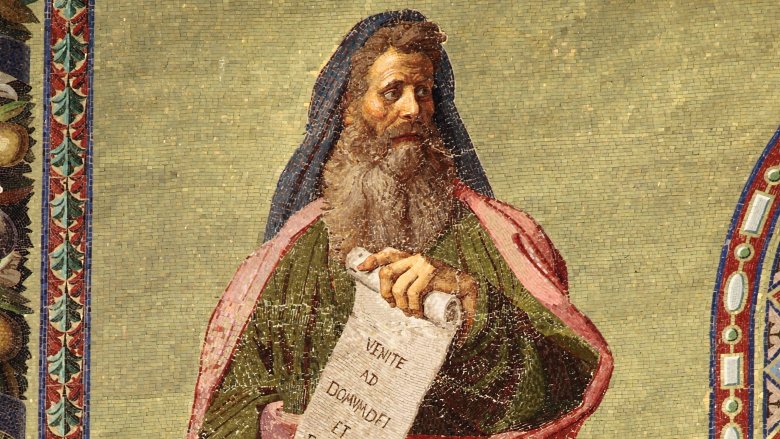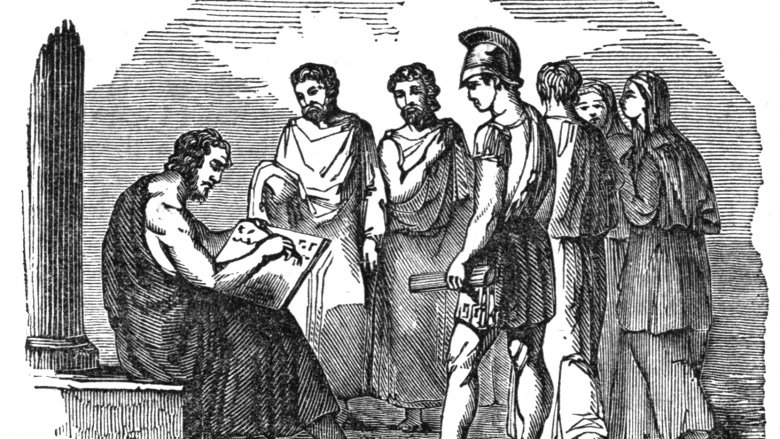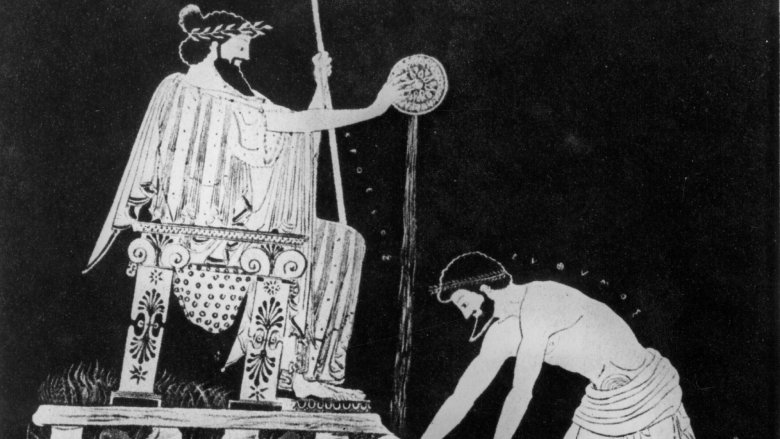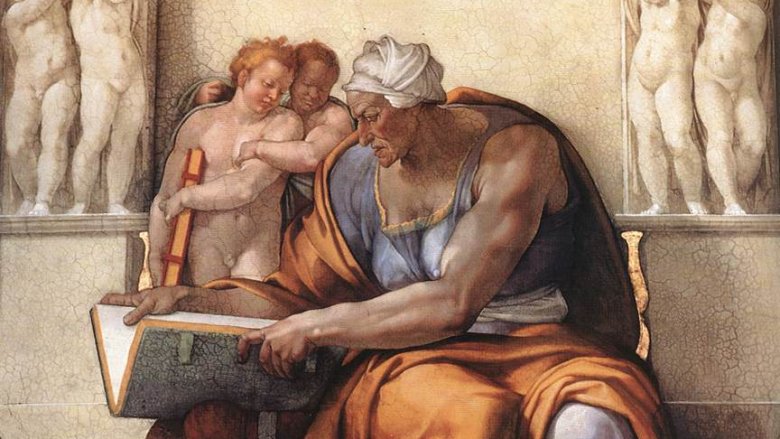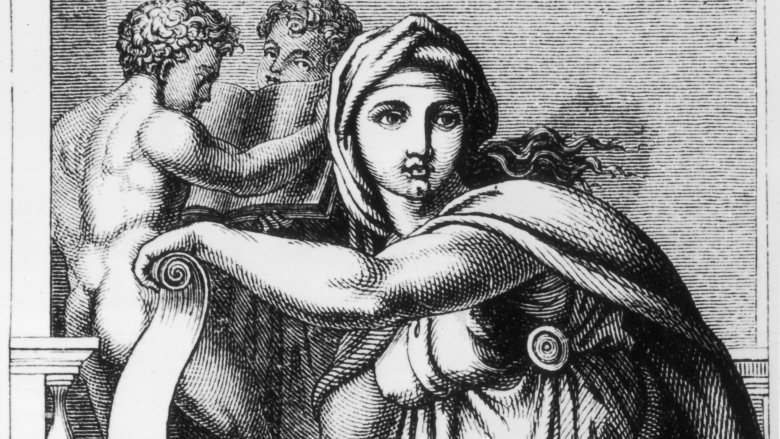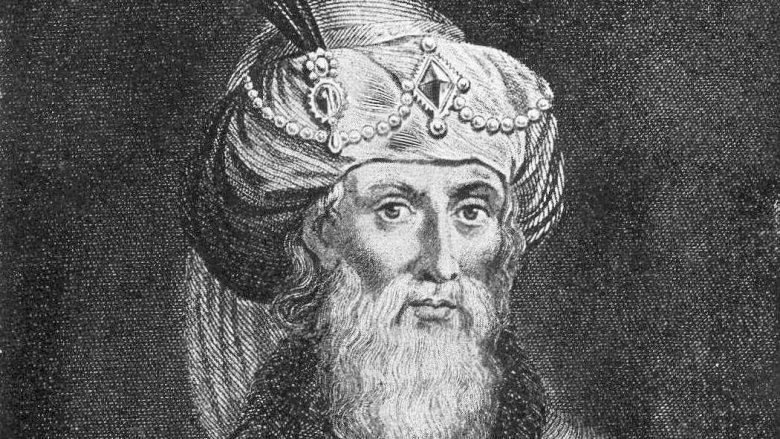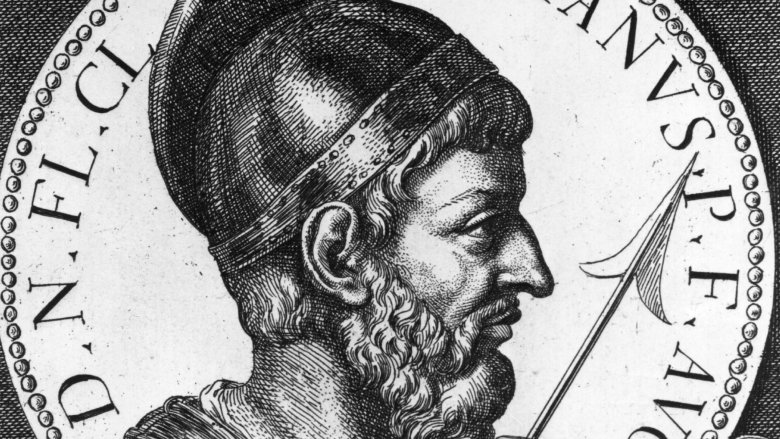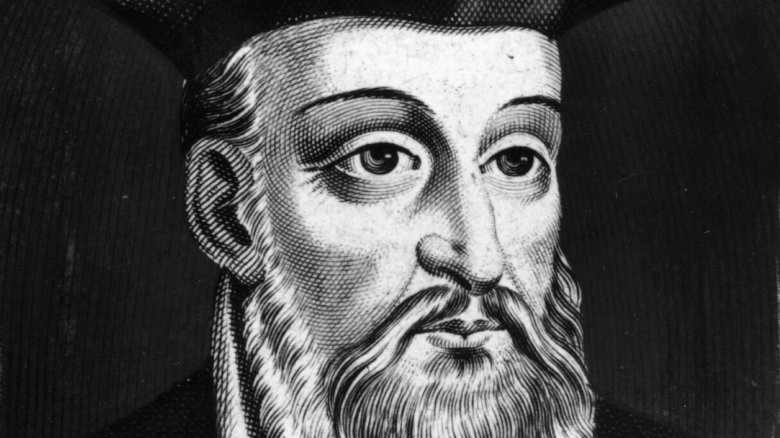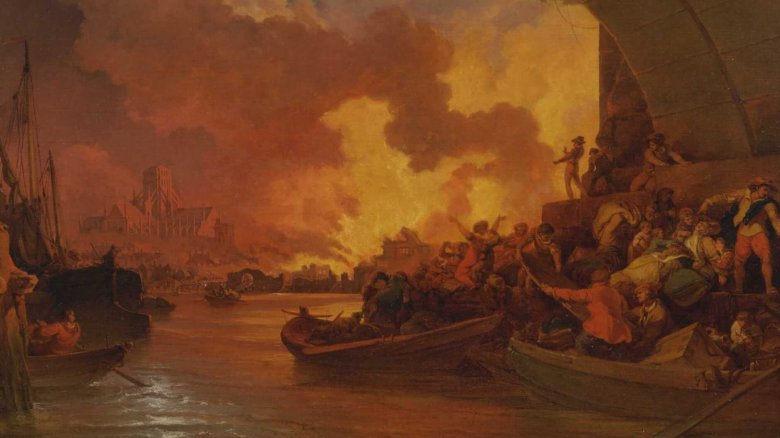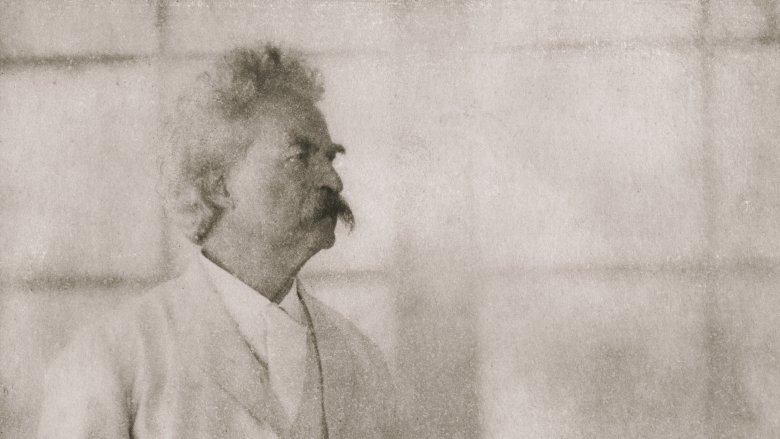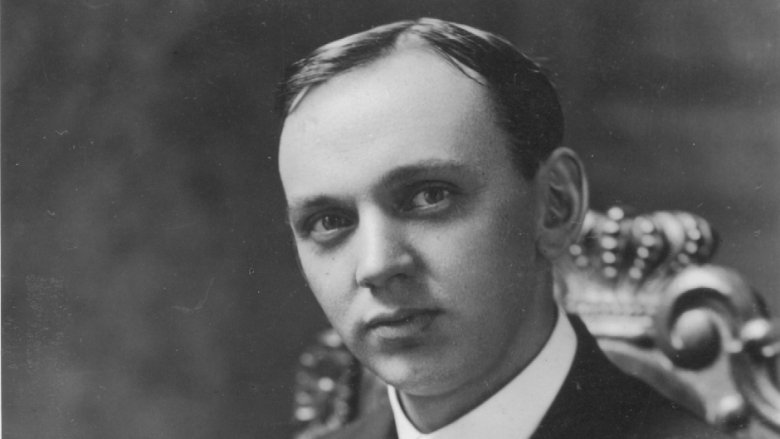Ancient Prophecies That Have Come True
For as long as there has been written history, there are records of people trying to predict the future through a special connection with a deity or a world of spirits, from mythological seers such as Tiresias to biblical prophets such as Isaiah to historical priests and priestesses such as the oracles at Delphi and Thebes. And it turns out if you throw enough stuff at the wall over, like, five millennia, some of that stuff is going to stick.
What follows is a list of prophecies from ancient to medieval to modern that have — apparently — come true. It's up to you to decide whether these successful predictions are due to coincidence, wishful thinking, pure fiction, or a true connection with a higher power. However, some of these prophecies were only published after the events they were predicting actually happened, so maybe enjoy these prophecies with a grain or twelve of salt.
The Delphic oracle predicts democracy
The Delphic oracle was pretty handily the most famous prophet of ancient Greece, a priestess of Apollo who spoke in riddles that were interpreted into other, different riddles by a class of priests called prophetai, which is the origin of our word "prophet." Many famous ancient people of both Greece and Rome consulted the Delphic oracle, and so it will pop up a few times in this list.
One such ancient famous person was the Athenian lawgiver Solon, who in 594 B.C.E. was given the task of reworking the laws of Athens after the code handed down by Draco, which were so severe that we to this day use the word "draconian" to refer to overly harsh laws. Rather than appointing himself god-king of everything like he could have, Solon decided to consult the oracle for advice in shaping Athens's future.
The reply he received was, "Sit in the middle of the ship, guiding straight the helmsman's task. Many of the Athenians will be your helpers." This, by the way, is what we meant by "riddles." Solon thankfully got the right idea: He's not the boss of everyone, but his job is to guide the ship and everyone has to work together. So he instituted a series of reforms such as trial by jury, ending debt slavery, and a number of changes that lessened the gap between the aristocracy and the common people. Solon's reforms at the oracle's advice helped lead the Greeks toward the democracy they're so famous for inventing today.
Greek oracles predict the downfall of Croesus
Croesus was the king of Lydia — today basically western Turkey — and was so good at accumulating wealth that we still to this day use the phrase "rich as Croesus" to mean someone with too much money. (According to legend, his wealth came from the fact that the sands of the river Pactolus in Lydia were rich with gold due to King Midas washing away his gold-touch curse there.)
After a few famous encounters with Solon, who we just told you about, Croesus became worried around the year 560 B.C.E. that the Persians, under the leadership of Cyrus the Great, were gaining too much power. So he consulted the oracles at Delphi and Thebes to see if he should go to war with them. He received the same answer from both: "If Croesus goes to war he will destroy a great empire." A later prophecy from Delphi told Croesus that his reign as king would last until a mule became king of the Medes. Croesus was completely stoked about these answers because obviously he was an idiot who didn't understand how riddles and metaphors work.
You see, Cyrus the Great was half-Mede and half-Persian. A mule is half-donkey and half-horse. This is a metaphor. In retrospect, yes, kind of a racist metaphor, but there it is nonetheless. At any rate, Croesus made war against Cyrus and did indeed destroy a great empire: his own. Cyrus felt bad for Croesus getting punked by the oracle, though, and decided not to kill him. So that's nice?
The Sibylline books predict the history of Rome (probably?)
The Cumaean Sibyl is another one of the most famous prophetesses of ancient times, thanks in part to an appearance in Virgil's Aeneid, Rome's national epic, and to her depiction as a super beefy lady by Michelangelo in the Sistine Chapel.
She is also famous for this story: During the reign of Tarquinius Superbus, the last king of Rome, which places this story around 530 B.C.E., the sibyl appeared to the king offering nine books of prophecy for a hefty price. Tarquinius refused, and so right in front of his eyes, the sibyl burned three of the books and offered the remaining six for the same price. Offended, Tarquinius refused again, only for the sibyl to burn three more and offer the remaining three for the same original price. This time Tarquinius panicked and agreed to pay tall dollars for one-third of the magic he could have had.
The Sibylline Books definitely were a real thing that existed, but we don't really know what they said apart from the fact that they were written as Greek poetry. The reason for this is that the Roman government was very fastidious about the safety and secrecy of the books. There were at one point fifteen dudes whose job was just to keep the books secret. So yeah, we don't know the prophecies specifically. But we do know the Romans consulted them in times of crisis, and that guided them to success until they were destroyed during the later days of the Roman empire.
The Delphic oracle helps the Greeks win the Persian war
You saw 300, right? Then you know that in 480 B.C.E., Xerxes, the king of Persia, invaded Greece in an attempt to succeed where his father, Darius, had failed. You also know that a handful of plucky, naked Spartans managed to hold off a much larger invading force at Thermopylae until they were betrayed. And if you saw 300, you also know that despite all their shouting and performative masculinity, all the Spartans died at Thermopylae and it was up to Athens to win the Persian War.
According to ancient historian Herodotus, the Athenians decided to consult the Delphic oracle about how to proceed with the war. The first response was ... not great. It literally began with, "You idiots, why are you still sitting here? Run for your lives." The Athenians, needless to say, were not happy with this response and asked if the gods had anything else to say.
The second response came back saying basically that the Greeks would still probably be destroyed but their only hope would come in the form of wooden walls. Several Athenian leaders said, "Great, build that wall, let's do it." But a young commander named Themistocles spoke up and said, "Hey, I think that means our navy, actually. Boats are made of wood, you see." Fortunately, they listened to him, and long story short, the Athenian navy stopped the Persian invasion at the battle of Salamis. Kind of. History is very complicated, folks. Read a book.
Josephus fudges a prophecy about Vespasian, but it comes true anyway
Joseph ben Mattathias was born in the year 37 B.C.E. and was a great student of Jewish law and history. By 67 C.E., however, he found himself entangled in the various Jewish revolts against the Roman Empire, and during a Roman siege on the city of Jotapata, he found himself in a suicide pact, as one does. The idea was that the army would rather die than be captured, but Josephus argued that suicide was an unforgivable sin and that they should all murder each other instead (better somehow?).
Anyway, Joseph survived and found himself confronted by the Roman general Vespasian. In order to appease this conqueror, Joseph repeated a messianic prophecy — probably the so-called Star Prophecy – and applied it to Vespasian, saying he would come out of Palestine and rule the whole world. Vespasian was sufficiently appeased and allowed Joseph to join the Romans, for which he was branded a traitor (that's bad), but he was appointed as a liaison for the Romans and the Jewish revolutionaries (that's good). But it didn't work out and the temple was destroyed and the revolution was put down (also bad).
However, Joseph's impromptu prophecy came true: in 68 C.E., the emperor Nero committed suicide, and (after a quick succession of three other guys) Vespasian became emperor. Joseph was freed and given the name Titus Flavius Josephus, meaning he had the same family name as Vespasian. He went on to become one of the greatest historians of Judaism and religion during the Roman empire.
Delphic oracle predicts its own demise
One last prophecy from the Delphic oracle, literally: The Roman emperor Julian was known as the Apostate, which is a person who backslides from or renounces a particular set of religious beliefs. You see, he became emperor in 361 C.E. and was the nephew of Constantine the Great, whom you may know as the emperor who legalized Christianity in Rome and ultimately led to Rome becoming Christian. Julian was considered an apostate because, well, he hated Christianity and wanted to return to traditional Roman religious values. He said Christianity, which he called "Galilean trickery," was a hillbilly religion and so tried to restore the classier cow-murdering religion of his youth.
According to legend, in 362 Julian sent the physician and medical writer Oribasius to the Delphic oracle to see what was up. Julian wanted to restore the oracle to prominence and had even exempted them from taxes in an attempt to help. Apparently the oracle was in bad shape at this time, following years of neglect by the now largely Christian Rome. The priestess offered to Oribasius one last major prophecy, about the oracle's own downfall: "Tell the emperor that my hall has fallen to the ground. Apollo no longer has his house, nor his mantic bay, nor his prophetic spring; the water has dried up."
Julian died the next year and the Christianity train kept rolling unimpeded. The last ever prophecy from Delphi came in 393 when the zealously Christian emperor Theodosius I closed it for good: "All is ended."
The Prophecy of the Popes predicts, well, all the popes
The end of the Roman empire means the end of antiquity, so let's jump ahead a bit and look at a prophecy that claims to be from the 12th century: The Prophecy of the Archbishop Saint Malachy About the Popes, better known as The Prophecy of the Popes.
This prophecy was published in 1595 as part of a book called Lignum Vitae, or the Wood of Life (who knows), which was a history of the Benedictine monks, that claims to be a 12th century prophecy by Saint Malachy that predicts all the popes from 1143 onward. Given that this prophecy didn't actually appear until 1595 and all the pope predictions are super accurate until about 1590, this has made some people suspicious of the authenticity of this prophecy, but plenty of people believe it.
Here are a sample prediction: the eleventh clue is "Sus in cribro," which means "pig in a sieve," which is something we all want for pope. Who was the pig in the sieve? Urban III. How do we know? Because this pope's human name was Crivelli, which means sieve, and his family has a pig on their coat of arms.
Believe it or not, the prophecies last until the current pope, with the previous clue, gloria olivae or "glory of the olive," pertaining to how much Benedict loved olives, apparently. But the final pope — our current pope — is supposed to be Petrus Romanus, Peter the Roman, during whose tenure the world ends. It ... could still happen?
Nostradamus predicts Hitler
When you clicked on the link for this list, you were probably thinking to yourself, "Oh boy, Nostradamus!" Well, you shouldn't have, because Michel de Nostredame lived in the 16th century, which isn't really ancient, but you're in luck because we knew you'd be expecting him (another prophecy that came true!), so here he is.
Nostradamus, as he is known, is famous for his 1555 book Les Propheties, or The Prophecies, in which he predicts major world events in mysterious quatrains that have subsequently been interpreted to be about everything from the death of Henry II to 9/11, which puts him in the same class as such venerable prophets as the X-Files spin-off The Lone Gunmen.
Anyway, he predicted Hitler, maybe. Two quatrains are said to be about him:
"From the depths of the West of Europe,
A young child will be born of poor people,
He who by his tongue will seduce a great troop;
His fame will increase towards the realm of the East."
And:
"Beasts ferocious with hunger will cross the rivers,
The greater part of the battlefield will be against Hister.
Into a cage of iron will the great one be drawn,
When the child of Germany observes nothing."
Well, there you have it. "Hister" and "Hitler" are kinda almost the same; Hitler definitely seduced a great troop with his tongue (gross); "the East" is where Japan is, so okay; Germany is mentioned; let's call this one a win for Nostradamus.
Nostradamus predicts Great Fire of London
All right, let's roll with Nostradamus for a minute and see if he can get another one. Nostradamus's predictions were meant to be long-term prophecies covering hundreds of years. His original intent was for Les Propheties to run ten volumes, covering a total of 2,000 years. That didn't happen, but his works still do manage to cover a wide variety of disasters from many different centuries, so here's one from a little closer to Nostradamus's own time, but still a full century after his death:
"The blood of the just will be demanded of London
Burnt by fire in the year '66
The ancient Lady will fall from her high place
And many of the same sect will be killed."
This one is nice because it has an actual number in it, so that narrows down the prediction to applying to 1566, 1666, 1766, 1866, 1966, or, you know, some time in the future. However, it turns out that London was actually burned by a considerable fire that lasted for three days and more or less destroyed the city in 1666. The prediction says that "many will be killed," though the death toll from the fire is thought to be just six people. Some say it's because lots of rats died, though. Okay, dude. Also, the fire started on Pudding Lane, which seems like a super glaring omission from a prophecy. Why would you skip an opportunity to predict pudding-related doom?
Mark Twain predicts his own death to the day
To follow up those ancient (and medieval and early modern) prophecies, here are a couple of more modern ones to go out on, starting with someone not usually associated with predicting the future: Mark Twain, the great American writer and humorist behind various things you read in high school.
Twain, whose real name was Samuel Clemens, was born in 1835, which by coincidence happened to be a year in which Halley's Comet was passing by the Earth, an event that only happens about once every 75 years. In 1909, when he was more than old enough to appreciate this coincidence, he said: "I came in with Halley's Comet in 1835. It is coming again next year, and I expect to go out with it. It will be the greatest disappointment of my life if I don't go out with Halley's Comet. The Almighty has said, no doubt: 'Now here are these two unaccountable freaks; they came in together, they must go out together.'"
Guess what? The two freaks went out together. Twain died of a heart attack the following year, one day after Halley's Comet was at its brightest. Dude not only wrote the great American novel (Huck Finn, maybe you've heard of it), but called the shot on his own death. That's a pretty boss move, and it puts him in company with guys like William the Conqueror and Genghis Khan, who also saw Halley's Comet as a personal omen.
H.G. Wells predicts all of modern technology
This one isn't ancient, but it also stretches the definition of "prophecy." It's still pretty cool, though, and there's already quite a bit of Delphic oracle in this list, so maybe you'll be fine with it.
Anyway: Herbert George Wells, known as H.G. Wells, is one of the most influential writers in the history of science fiction, with such works as War of the Worlds, The Time Machine, and The Invisible Man all counted as stone-cold classics of the genre. In addition to being a compelling storyteller and a powerhouse imagination, Wells also had the benefit of training as a scientist, meaning that many of the fantastic elements of his novels had a grounding in realistic science.
As a result, many of his works include elements of science that were then fantastical but which have since become real science, many of which have been cataloged by Smithsonian magazine. Examples include wireless phones in Men Like Gods, audio books in The Sleeper Wakes, genetic engineering in The Island of Doctor Moreau, lasers in The War of the Worlds, and atomic bombs in The World Set Free, all in the late 19th and early 20th century.
Fortunately, Wells has so far been wrong about Martians invading the Earth, but he did have as his intended (but, alas, unused) epitaph, "I told you so, you damned fools," which is probably the only bigger boss move than Twain calling his shot.
Edgar Cayce predicts the stock market crash of 1929
Edgar Cayce was an American mystic from Kentucky whose claim to fame was entering into a trance and uttering prophecies on such wide topics as wars, Atlantis, mergers among communication companies, and the Earth's magnetic poles. Because of his predilection for telling the future while in a trance, he is popularly known as the Sleeping Prophet, and he is generally considered to have been at the forefront of the New Age movement. His proponents included such notable names as Woodrow Wilson, Thomas Edison, and George Gershwin (note to young people: this is a notable person).
According to Edgar Cayce's Association for Research and Enlightenment, in 1925, Cayce was doing a reading for a doctor and told him that he would come into a great deal of money, but that he should be careful because of "adverse forces that will come then in 1929." And then later, in 1929, six months before the stock market crash that helped lead to the Great Depression, he warned of a "great disturbance in financial circles" and that "we may expect a considerable break and bear market, see? This issue being between those of the reserves of nations and of INDIVIDUALS, and will cause — unless another of the more STABLE banking conditions come to the relief — a great disturbance in financial circles. This warning has been given, see?"
Not only did all of that turn out to be right, it was also way more specific than anything Nostradamus said. In this case, mighty Cayce did not strike out.
